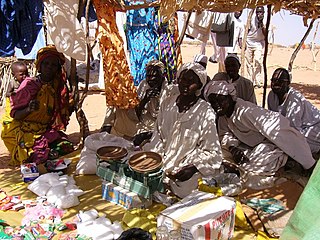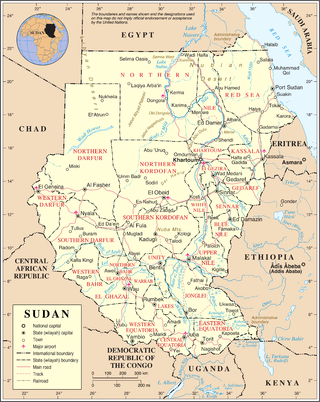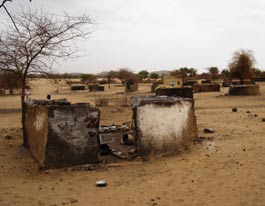
The African Union Mission in Sudan (AMIS) was an African Union (AU) peacekeeping force operating primarily in the country's western region of Darfur to perform peacekeeping operations related to the Darfur conflict. It was founded in 2004, with a force of 150 troops. By mid-2005, its numbers were increased to about 7,000. Under United Nations Security Council Resolution 1564, AMIS was to "closely and continuously liaise and coordinate ... at all levels" its work with the United Nations Mission in Sudan (UNMIS). AMIS was the only external military force in Sudan's Darfur region until UNAMID was established. It was not able to effectively contain the violence in Darfur. A more sizable, better equipped UN peacekeeping force was originally proposed for September 2006, but due to Sudanese government opposition, it was not implemented at that time. AMIS' mandate was extended repeatedly throughout 2006, while the situation in Darfur continued to escalate, until AMIS was replaced by UNAMID on 31 December 2007.

United Nations Security Council Resolution 1564, adopted on 18 September 2004, after recalling resolutions 1502 (2003), 1547 (2004) and 1556 (2004), the Council threatened the imposition of sanctions against Sudan if it failed to comply with its obligations on Darfur, and an international inquiry was established to investigate violations of human rights in the region.

While there is a consensus in the international community that ethnic groups have been targeted in Darfur and that crimes against humanity have therefore occurred, there has been debate in some quarters about whether genocide has taken place there. In May 2006, the International Commission of Inquiry on Darfur organized by United Nations "concluded that the Government of the Sudan has not pursued a policy of genocide ... [though] international offences such as the crimes against humanity and war crimes that have been committed in Darfur may be more serious and heinous than genocide." Eric Reeves, a researcher and frequent commentator on Darfur, has questioned the methodology of the commission's report.

United Nations Security Council Resolution 1679, adopted unanimously on May 16, 2006, after recalling resolutions 1556 (2004), 1564 (2004), 1574 (2004), 1590 (2005), 1591 (2005), 1593 (2005), 1663 (2005) and 1665 (2006) on the situation in Sudan, the Council endorsed a decision by the African Union Peace and Security Council to move ahead with a United Nations peacekeeping force in Darfur as soon as possible.

United Nations Security Council resolution 1591, adopted on 29 March 2005, after recalling resolutions 1547 (2004), 1556 (2004), 1564 (2004), 1574 (2004), 1585 (2005), 1588 (2005) and 1590 (2005) on the situation in Sudan, the council placed a travel ban and asset freeze on those "impeding the peace process" in Darfur.

United Nations Security Council Resolution 1706, adopted on August 31, 2006, after recalling previous resolutions on the situation in Sudan, including resolutions 1556 (2004), 1564 (2005), 1574 (2004), 1590 (2004), 1591 (2005), 1593 (2004), 1663 (2006), 1665 (2006) and 1679 (2006), the Council expanded the mandate of the United Nations Mission in the Sudan (UNMIS) to include deployments in Darfur to enforce the Darfur Peace Agreement.

The African Union-United Nations Hybrid Operation in Darfur was a joint African Union (AU) and United Nations (UN) peacekeeping mission formally approved by United Nations Security Council Resolution 1769 on 31 July 2007, to bring stability to the war-torn Darfur region of Sudan while peace talks on a final settlement continue.

United Nations Security Council Resolution 1769, adopted unanimously on July 31, 2007, after reaffirming all resolutions on the situation in Sudan, the Council established the joint African Union – United Nations Hybrid Operation in Darfur (UNAMID) in an attempt to end the violence in Darfur, for an initial period of twelve months.
United Nations Security Council Resolution 1935, adopted unanimously on July 30, 2010, after reaffirming all previous resolutions and statements on the situation in Sudan, the Council extended the mandate of the African Union – United Nations Hybrid Operation in Darfur (UNAMID) for a further 12 months until July 31, 2011 and demanded an end to fighting and attacks on United Nations personnel and civilians.

United Nations Security Council resolution 1547, adopted unanimously on 11 June 2004, after welcoming the commitment of the Sudanese government and Sudan People's Liberation Army/Movement (SPLA/M) to work towards a full ceasefire and peace agreement to end the Second Sudanese Civil War, the council established a United Nations Advance Team in Sudan to prepare for a future United Nations operation following the signing of the Comprehensive Peace Agreement. The brief reference to the situation in the Darfur region divided Council members, with Algeria, China and Pakistan against a mention of Darfur and the other two-thirds of the council supporting its inclusion.

United Nations Security Council Resolution 1945, adopted on October 14, 2010, after recalling previous resolutions on the situation in Sudan, the Council extended the mandate of an expert panel monitoring an arms embargo and other sanctions on groups that "impede peace in Sudan" until October 19, 2011.

United Nations Security Council resolution 1556, adopted on 30 July 2004, after recalling resolutions 1502 (2003) and 1547 (2004) on the situation in Sudan, the council demanded that the Sudanese government disarm the Janjaweed militia and bring to justice those who had committed violations of human rights and international humanitarian law in Darfur.

United Nations Security Council Resolution 1574, adopted unanimously at a meeting in Nairobi, Kenya, on 19 November 2004, after recalling resolutions 1547 (2004), 1556 (2004) and 1564 (2004), the council welcomed political efforts to resolve the conflicts in Sudan and reiterated its readiness to establish a mission to support the implementation of a Comprehensive Peace Agreement.

United Nations Security Council Resolution 1590, adopted unanimously on 24 March 2005, after recalling resolutions 1547 (2004), 1556 (2004), 1564 (2004), 1574 (2004), 1585 (2005) and 1588 (2005) on the situation in Sudan, the Council established the United Nations Mission in Sudan (UNMIS) for an initial period of six months.

United Nations Security Council Resolution 1663, adopted unanimously on March 24, 2006, after recalling previous resolutions on the situation in Sudan, particularly 1627 (2005) and 1653 (2006), the Council extended the mandate of the United Nations Mission in Sudan (UNMIS) for six months until September 24, 2006.

United Nations Security Council Resolution 1714, adopted unanimously on October 6, 2006, after recalling previous resolutions on the situation in Sudan, particularly resolutions 1590 (2005), 1627 (2005), 1653 (2006), 1653 (2006), 1663 (2006), 1679 (2006), 1706 (2006) and 1709 (2006), the Council extended the mandate of the United Nations Mission in Sudan (UNMIS) until April 30, 2007.
United Nations Security Council Resolution 1828 was adopted on 31 July 2008.
United Nations Security Council Resolution 1881 was unanimously adopted on 30 July 2009.
United Nations Security Council Resolution 1841 was unanimously adopted on 15 October 2008.

The Darfur genocide was the systematic killing of ethnic Darfuri people during the War in Darfur. The genocide, which was carried out against the Fur, Masalit and Zaghawa ethnic groups, led the International Criminal Court (ICC) to indict several people for crimes against humanity, rape, forced transfer and torture. An estimated 200,000 people were killed between 2003 and 2005. Other sources estimate that between 2003 and 2008, the conflict resulted in about 300,000 civilian deaths and about 2.7 million displaced civilians.















